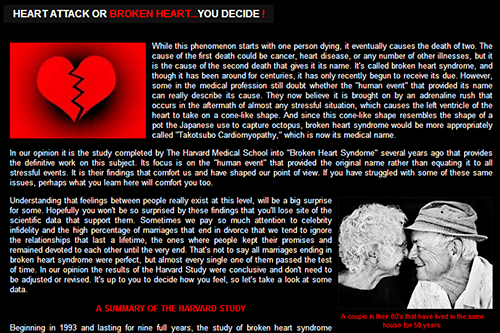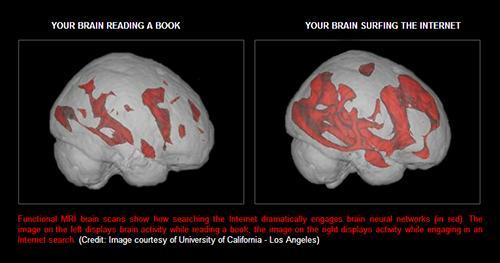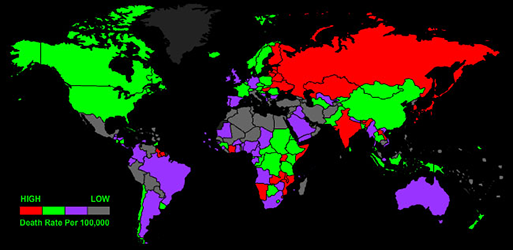UNEMPLOYMENT REDUCES LIFE EXPECTANCY...
Accurate unemployment statistics are not easy to find for some countries in the world, but the principles are the same no matter where you live....when a large number of people cannot find work they lose more than money. Many lose their lives. One estimate based upon historical data found that during prolonged economic downturns each 1% increase in unemployment results in 37,000 deaths...making having no job the most dangerous job of all
While it's true unemployment rates have declined in America and other parts of the world, it is equally true suicide deaths are on the rise. In certain areas of some countries they have increased by as much as 25% since the global recession began. Since it can take as many as 6 years for all the data to be compiled the proper lens to project the toll in lost lives is to carve out a section of how the growth in unemployment unfolded which is reflected in the US unemployment maps below.
According to the US Bureau of Labor Statistics during the peak of the recession more than 31 million Americans were unemployed, including those who were "underemployed" and those who lost hope and stopped looking. The reduction in Life Expectancy many of these people and their families have and will face in the years to come is hard to estimate, at this point in the process, but that doesn't make it any less real. There was and still is a global Economic War taking place and many of the participants are fighting for their lives. Looking at the unemployment maps below from this perspective gives them new meaning and we hope an added sense of urgency to get this problem resolved.
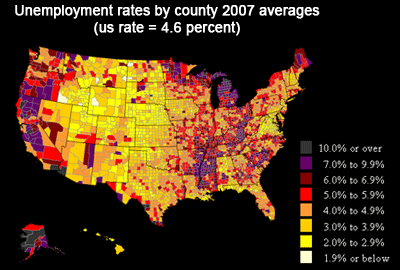
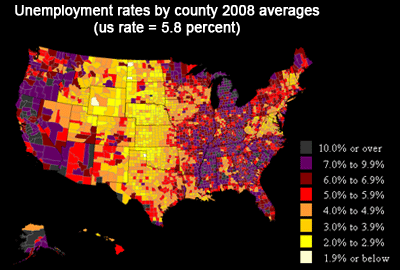
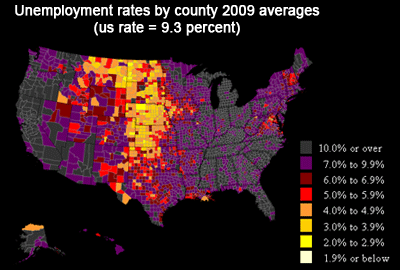
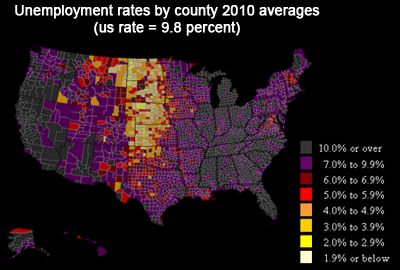
According to renowned risk expert, Bernard L. Cohen PhD, life expectancy varies substantially with occupation. Post office employees, university professors, workers in clothing manufacturing and in communications industries live 1-2 years longer than average. Minors, policemen, firemen, truck drivers, and fishermen die 2-3 years younger than average, but poverty even during the best of times can reduce life expectancy by as much as 9 years and not just in the US. In Britain, the difference in life expectancy between "professionals" and unskilled workers is estimated to be 7.2 years. When Canadian men were ranked by income the top 10% have 32% less incidences of heart disease and stroke, 34% less cancer and 88% fewer deaths by accidents from poison and violence. With few exceptions extended unemployment puts everyone on a path to poverty in their "mind's eye" if not in real terms...
The first indication that suicide rates are on the rise is calls to the national suicide hotlines which reached almost 60,000 in May of 2010 alone. Hirsch Mental Health in LA reportedly received more than twice as many calls in 2008 than in any previous year. Historically we know that the highest suicide rate in history was in 1933 during the heart of the great depression. We could show you other historical studies that indicate the risk of suicide is triple among the unemployed, but we intend to avoid this data, for now, because even these stats can be debated based upon different economic conditions in the country at the time these studies were compiled. Suicide is a factor, but to reach a ratio of 37,000 deaths for each 1% increase in unemployment many other variables must be considered.
SUICIDE IS NOT THE ONLY PROBLEM
When you add the increases in domestic violence, alcohol consumption, admissions to mental hospitals, and stress induced heart disease, stroke and cancer into the equation, just to name a few, it's not hard to imagine the depth and length of the unemployment problem we've faced even exceeding the 1%-37,000 death ratio that's been so hard to define. Improved healthcare will help, but it is often after the fact which means much of the damage is already done. On the surface it would seem that charity is the solution, but the evidence is clear the problem runs much deeper than that. The decline in self worth and confidence taking place requires more than just acts of generosity and kindness to resolve.
Part of this responsibility rests with our leaders, but the circumstances we find ourselves in are beyond politics. All of us are involved and we must do what we can to increase the understanding that saving or providing a Job could mean saving a life and this message ought to be included in our national debate. A forward thinking approach to this problem that produces more immediate results must enter this equation now, too much is at stake to delay any longer. Tom LeDuc




